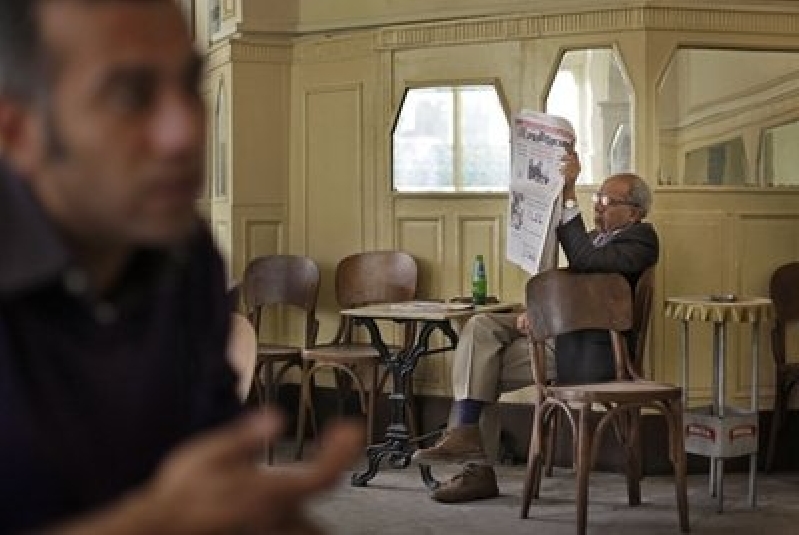
With the Muslim Brotherhood poised to play a growing role in Egypt’s government following the resignation of the country’s long-time president, many observers have been looking into the long-banned group for clues to what lies ahead for Egypt.
But the group, as many are coming to find, may very well be as murky as the North African country's future.
"It's never entirely clear with the Brothers," Dr. Josh Stacher of Kent State University told the Wall Street Journal in a report Tuesday.
"It's a big group, with lots of different points of view,” added the political science professor, who spent years in Egypt studying the organization. “You can find the guy always screaming about Israel and then you got the other guys who don't care about Israel because they're too busy worrying about raising literacy rates."
Known also as al-Ikhwan al-Muslimin, the Muslim Brotherhood is one of the oldest and most influential Islamic movements in the world. The movement’s stated goal is to instill the Qur'an and Sunnah as the "sole reference point for ... ordering the life of the Muslim family, individual, community ... and state."
“The Brotherhood are, if anything, dedicated pragmatists,” remarked D.C.-based consultant Bob Kubinec in a guest opinion column for Christianity Today.
“The worst that could be said of the Brotherhood is that they would continue the status quo,” he added after noting the widespread social discrimination against Christians in Egypt.
Since its foundation in 1928, the Muslim Brotherhood has combined religion, political activism, and social welfare in its work. The Islamic revivalist movement adopted slogans such as “Islam is the solution” and has sought the establishment of an Islamic state. But sympathizers claim the basic desire of the Brotherhood is to be able to practice Islam as they want to without interference from the state.
“Although it may appear at first counter-intuitive, Egypt's Christians could well be safer if the Muslim Brotherhood were a part of the ruling government,” wrote Kubinec.
Critics, however, disagree.
While members of the Brotherhood include young moderates whose political views on issues such as women's rights and religious freedom mesh with Western values, the movement also includes older conservatives who rail against American imperialism and call for the establishment of an Islamic state.
And notably, the latter outnumbers the former, especially in the leadership, where reportedly no one is under 50.
“Islam is neither philosophically nor theologically compatible with other religions or with democracy. Therefore, it is difficult to take seriously the Muslim Brotherhood’s claims that it wants nothing more than a democratic government,” remarked Dave James, co-founder of the Alliance for Biblical Integrity, in a response to Kubinec’s article.
So while pro-democracy protesters in Egypt celebrate the resignation of Egyptian President Hosni Mubarak following 18 days of protests, it remains unclear how Friday's change will affect the country – particularly the 10-million-large Christian minority in Egypt.
“The people are afraid for the future, since this is an extremely critical time,” remarked one church pastor who partners with Open Doors in Egypt. “But we trust in God, and we hope and pray for a new Egypt with democracy and freedom for Christians.”
Accordingly, persecution watchdog groups such as Open Doors have issued prayer requests for Egypt, which was ranked No. 19 on the Open Doors 2011 World Watch List of the 50 worst persecutors of Christians.
“We need to remember the church. We need to remember that the Christians in Egypt face the ‘frying pan and the fire,'” commented Dr. Carl Moeller, President/CEO of Open Doors USA. “Their hope is in Jesus Christ and in His sovereignty, but the reality for our brothers and sisters in Egypt is that they face an increasingly uncertain future."
According to a survey conducted by the Pew Research Study, 84 percent of Egyptian citizens say they would favor public execution of those who leave Islam for another religion and seventy-six percent of Egyptians favor stoning for those caught in adultery.
Such punishments would be carried out under sharia or Islamic law, which Muslim Brotherhood has sought to have implemented in the country.
On Tuesday, the Muslim Brotherhood announced its intention to form a political party once democracy is established in Egypt. The country's new military rulers, meanwhile, launched a panel of experts to amend the country's constitution enough to allow democratic elections later this year.
Generals from the Armed Forces Supreme Council, which now rules Egypt, said Tuesday the military wants to hand power to a government and elected president within six months. The new constitutional panel is mandated to draw up amendments within ten days to be put to a referendum, paving the way for elections.







